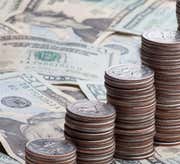
|
Treasury bills, or T-bills, are short-term debt instruments issued by the U.S Treasury. T-bills are issued for a term of one year of less. T-bills are considered the world’s safest debt as they are backed by the full faith and credit of the United States government.
A key indicator
The T-bill rate is a key barometer of short-term interest rates. Treasury bills are sold with maturities of four, thirteen, twenty-six and fifty-two weeks. They do not pay interest, but rather are sold a discount to their face value. The full-face value is paid at maturity, and the difference between the discounted purchase price and the full-face value equates to the interest rate.
Purchasing T-Bills
There are three ways to purchase T-bills and all other Treasury securities:
· Non-competitive bid auctions allow investors to submit a bid to purchase a set dollar amount of the Bills at the next auction. The yield they receive is based upon the average auction price from all bidders. This is a good method for individual investors and can be done via the TreasuryDirect site. The maximum amount that can be purchased through a non-competitive bid is $5 million.
Competitive bidding auctions are geared for those who only want to buy the bills at a specific or desired yield. These bids must be made via a bank or a broker. A buyer can purchase up to 35% of the amount of the initial offering for the bill being auctioned.
· You can purchase them on the secondary market or via mutual funds and ETFs. T-bills, like all Treasury securities, can be bought and sold on the secondary market. Additionally, there are a number of mutual funds and ETFs that purchase T-bills.
The secondary market
There is an active secondary market for T-bills, but in order to buy or sell bills here you will need to use a broker as a middle-man. T-bills are very liquid and short-term, but the price will fluctuate based on movements in the rate on newly issued T-bills.
Who are the major buyers?
Although T-bills can be bought by individual investors, primary dealers, such as banks and broker-dealers, are the biggest purchasers of T-bills at the various auctions.
Other major auction participants include investment funds, pension plans and retirement funds, insurance companies and other large institutional managers.
Money Market: Certificate Of Deposit (CD)
-
 Investing
InvestingThe Basics Of The T-Bill
The U.S. government has two primary methods of raising capital. One is by taxing individuals, businesses, trusts and estates; and the other is by issuing fixed-income securities that are backed ... -
 Investing
InvestingIntroduction to Treasury Securities
Purchasing Treasury securities backed by the U.S. government and knowing their characteristics can provide a steady guaranteed income and peace of mind. -
 Investing
InvestingHow to Buy Treasuries Directly From the Fed
If you want to purchase government debt securities, go straight to the source at the Federal Reserve. Learn how individual investors can buy these directly. -
 Investing
InvestingWhy You Should Stick with Stocks over the Long Term
Over the long term, it pays to stick with stocks, despite the inevitable bouts of volatility that wrack stock markets from time to time. -
 Investing
Investing4 Ways to Define and Pursue Financial Certainty
There are several approaches that may help you reach your own definition of financial certainty. -
 Investing
InvestingUnderstanding Risk is Key to Your Investing Strategy
Here's why considering all types of risk is crucial for a successful investment plan. -
 Investing
Investing4 Types Of Money Market Yields
Learn to calculate, and discover the difference between the 4 types of yields; bank discount yield, holding period yield, effective annual yield, and money market yield -
 Investing
InvestingGet A Short-Term Advantage In The Money Market
This investment vehicle is often the perfect stop-gap measure for growing your money.


